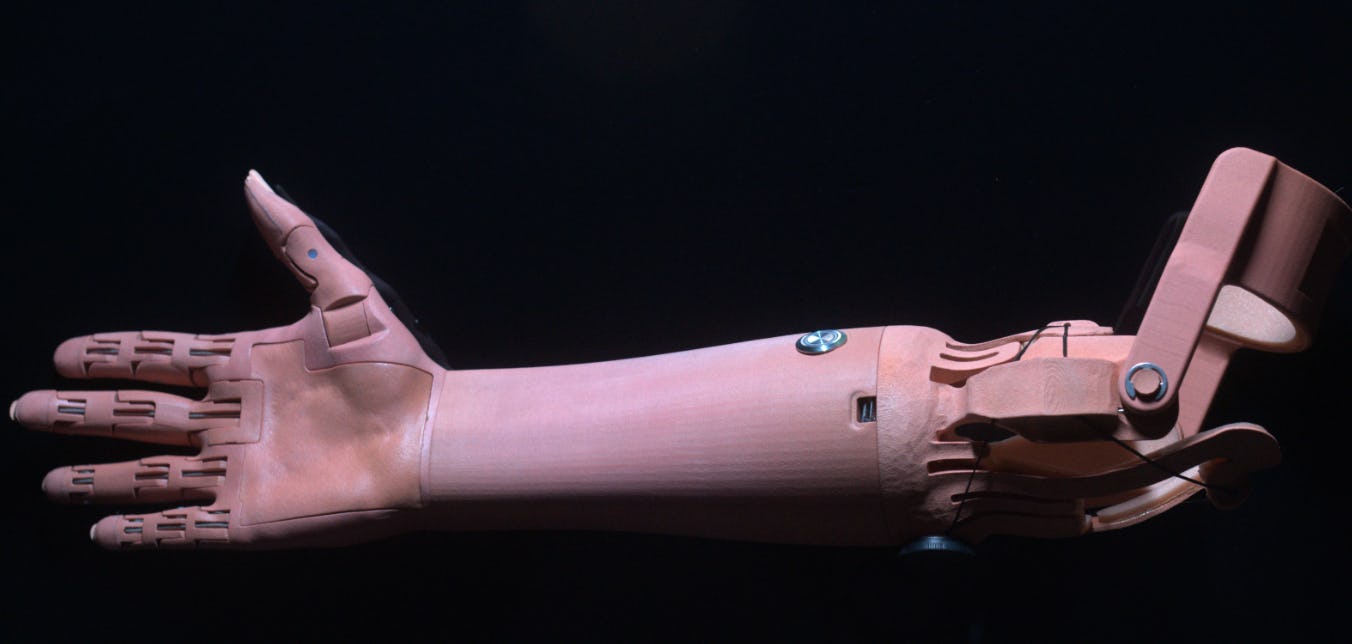
An estimated 40 million people across the world need a prosthetic limb. but the functionality of commercial limbs has remained stagnate -- not to mention expensive. A new prosthetic can cost anywhere between $5,000 – $50,000, according to the Jordan Thomas Foundation, and considering how growing children need upgrades every few years, the cost can easily reach past $200,000. With the introduction of its customizable "TrueLimb" prosthetic, Unlimited Tomorrow hopes to fix this problem.
What is it -- TrueLimb is a customizable and affordable alternative to commercial-grade prosthetic limbs that can cost upwards of $80,000 for a single unit. For growing children that need at least four to five new prostheses in adolescence, this price is astronomical.
Easton LaChappelle, the company's founder and CEO, tells Inverse that he was drawn to robotics at an early age and discovered the need for advanced prostheses for children when presenting his work at a high school science fair in 2013.
"I was the kid who would run home from school and stay up until three in the morning researching how to code and write software. I was just fascinated by the concept of robotics and when I was 14 I came up with my idea to make a robotic hand," says LaChappelle. "I started working on taking this very simple robotic hand up to a full, 3D printed robotic arm... [It was] during the 2013 state science fair in Colorado [that] I met a small girl with a very simple prosthesis. It was essentially a human-like claw with one motion and one sensor. I started talking to her parents and learned that this [prosthetic] was $80,000 and that she'd surely outgrow it."
LaChappelle says that this interaction gave him a new passion and purpose with his interest in robotics, beyond simply tinkering in his bedroom. After six years of work, and partnerships with companies like Microsoft and Dassault Systèmes, the company soft-launched its own affordable and customizable prosthesis service in June 2020.
How is it made -- Unlike other commercial prosthetic companies, which largely work to fit customers to existing prosthetic limb structures, Unlimited Tomorrow chose to take a customer-first approach instead.
The design process starts with Unlimited Tomorrow sending customers 3D image scanners to scan both of their arms in order to fit the prosthesis's socket to their limb difference as well as model the prosthetic after their other arm.
"Getting a prosthetic is...actually more of a psychological need. And that's where the current healthcare system really fails these individuals."
After completing the scan and sending it off to Unlimited Tomorrow, customers will receive several different socket options and will have a live consultation with the company to optimize fit and comfort on their limb. After finding the right fit, Unlimited Tomorrow hand-crafts these 3D printed limbs to mimic the structure of the customer's existing limb. These nylon arms are durable, flexible and weigh-in at just a pound and a half and come with 450 skin tone options.
These realistic arms even come with fingernails you can paint.
And because these limbs are 3D printed, LaChappelle says this provides the perfect opportunity to include a hollow interior for electronics as well, including 36 muscle sensing, A.I. powered sensors that learn a customer's movements to provide realistic, real-time movement of their limb. The prosthetics are also outfitted with multi-day battery life, individual finger control, and multi-grip functionality.
How is it so cheap -- Priced at $7,995 per unit, or $259/month for three years, TrueLimb is 80 percent cheaper than its competitors on average. LaChappelle tells Inverse that this price can be in part attributed to their partnerships with companies like Microsoft as well as cutting out the middle-man for this product. Instead of going through insurance, which can allow prosthetic companies to ramp up their prices, TrueLimb is direct to consumer.
LaChappelle says that the company also offers lower-cost upgrades for children when they outgrow their prosthetic. Instead of buying an entirely new unit, TrueLimb will up-cycle old parts of the prosthetic and manufacture a new one for half-price -- $4,000.
Who is it for -- LaChappelle says that TrueLimb's technology can make prosthetics for children as young as seven with no upper threshold on age or size, but says that children are currently the company's focus.
"We work with everybody," says LaChappelle. "[But] our main focus is children and that's where, for me personally, I think the need for this industry primarily falls."
What's next -- The company has only just soft-launched its product, but LaChappelle says it already has plenty of plans for the future.
"We're building up to a much bigger launch later this year," says LaChappelle. "And from there we're going to start working with new technologies, [such as] a powered elbow so we can work with people who are missing above their elbow... [We also] have a couple of patents on exoskeletons to allow someone who's paralyzed to regain the ability to walk."
LaChappelle tells Inverse that ultimately the company hopes that through its technology it can help customers not only overcome physical challenges but emotional ones as well.
"We get a lot of requests from above the age of seven, which is where children start going to school [and] other kids tell them that they're different," says LaChappelle. "A lot of times, [getting a prosthetic] is not so much a physical need of learning to tie your shoes, it's actually more of a psychological need. And that's where the current healthcare system really fails these individuals."







